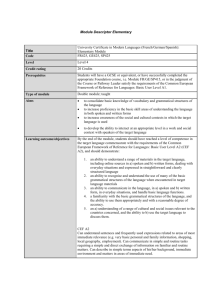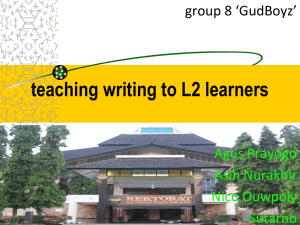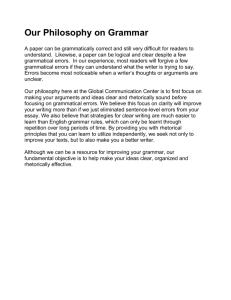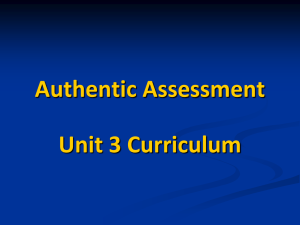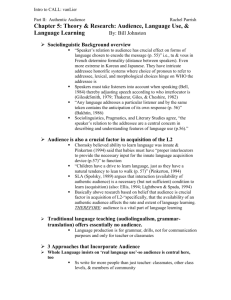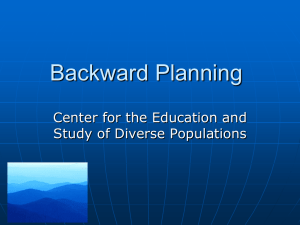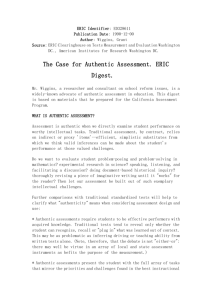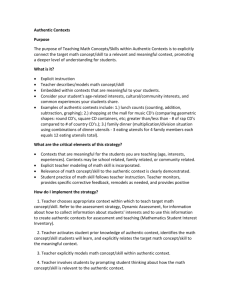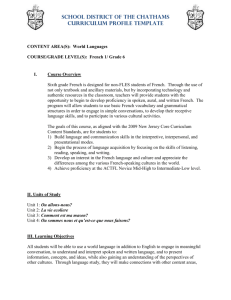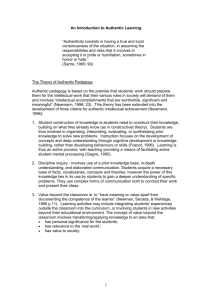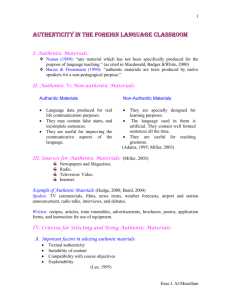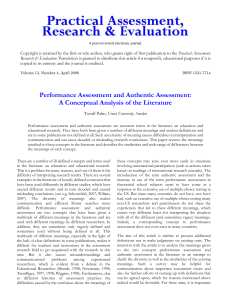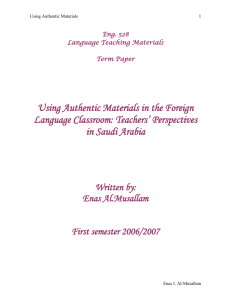My teaching philosophy By Samuel Farsure In today`s world of
advertisement
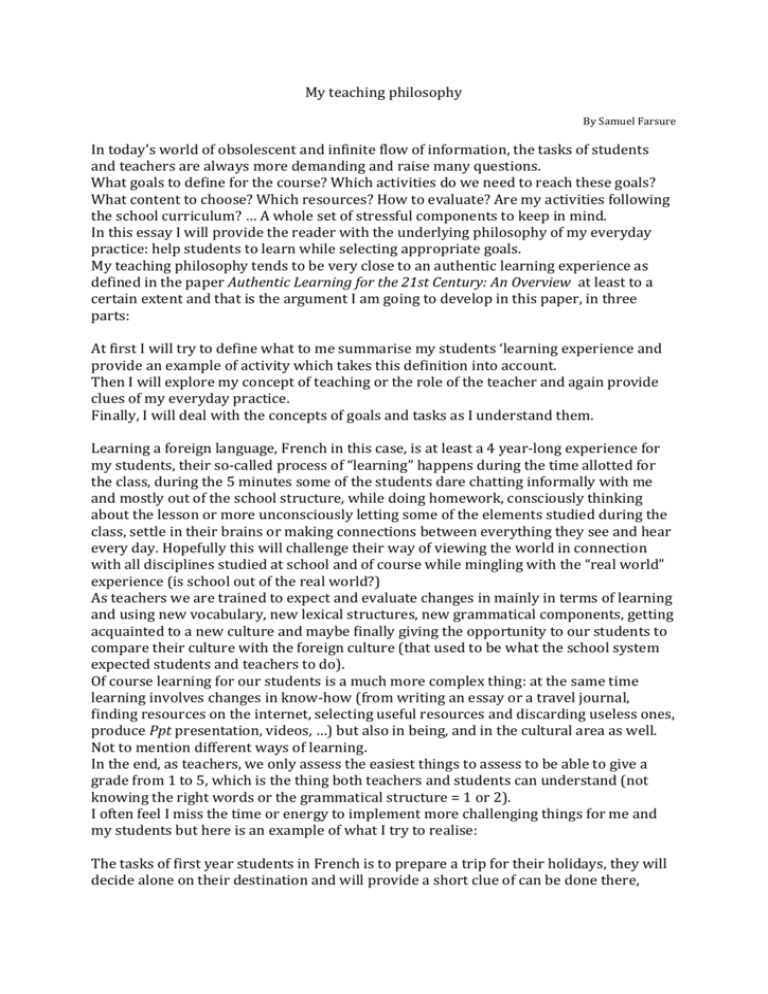
My teaching philosophy By Samuel Farsure In today's world of obsolescent and infinite flow of information, the tasks of students and teachers are always more demanding and raise many questions. What goals to define for the course? Which activities do we need to reach these goals? What content to choose? Which resources? How to evaluate? Are my activities following the school curriculum? … A whole set of stressful components to keep in mind. In this essay I will provide the reader with the underlying philosophy of my everyday practice: help students to learn while selecting appropriate goals. My teaching philosophy tends to be very close to an authentic learning experience as defined in the paper Authentic Learning for the 21st Century: An Overview at least to a certain extent and that is the argument I am going to develop in this paper, in three parts: At first I will try to define what to me summarise my students ‘learning experience and provide an example of activity which takes this definition into account. Then I will explore my concept of teaching or the role of the teacher and again provide clues of my everyday practice. Finally, I will deal with the concepts of goals and tasks as I understand them. Learning a foreign language, French in this case, is at least a 4 year-long experience for my students, their so-called process of “learning” happens during the time allotted for the class, during the 5 minutes some of the students dare chatting informally with me and mostly out of the school structure, while doing homework, consciously thinking about the lesson or more unconsciously letting some of the elements studied during the class, settle in their brains or making connections between everything they see and hear every day. Hopefully this will challenge their way of viewing the world in connection with all disciplines studied at school and of course while mingling with the “real world” experience (is school out of the real world?) As teachers we are trained to expect and evaluate changes in mainly in terms of learning and using new vocabulary, new lexical structures, new grammatical components, getting acquainted to a new culture and maybe finally giving the opportunity to our students to compare their culture with the foreign culture (that used to be what the school system expected students and teachers to do). Of course learning for our students is a much more complex thing: at the same time learning involves changes in know-how (from writing an essay or a travel journal, finding resources on the internet, selecting useful resources and discarding useless ones, produce Ppt presentation, videos, …) but also in being, and in the cultural area as well. Not to mention different ways of learning. In the end, as teachers, we only assess the easiest things to assess to be able to give a grade from 1 to 5, which is the thing both teachers and students can understand (not knowing the right words or the grammatical structure = 1 or 2). I often feel I miss the time or energy to implement more challenging things for me and my students but here is an example of what I try to realise: The tasks of first year students in French is to prepare a trip for their holidays, they will decide alone on their destination and will provide a short clue of can be done there, where they are going to sleep, how they are going to go there, how much the trip will cost. The ultimate task is a Ppt presentation in front of the class with peer assessment. This type of activity includes much more than “managing” the language and the criteria involved in the assessment are also concerned with the ability of my students to find and select relevant elements, make choices and prepare a satisfactory presentation: things relevant for a professional or non-professional life. In brief we help them developing their autonomy. I guess such this example provides an insight of what authentic learning means to me and how to put it into practice. Let me turn now to how I see my role as a teacher. I truly believe people rely too much on habits (good or bad) and this reliance often prevents them to be creative or bring out the best of what they could do or simply shift from being passive to active. I have never had myself as a lecturer thought the role fits in the everyday life at school when needed. Most of what is French culture or French grammar is available somewhere on the internet to me and my students in millions of different forms (having a textbook in the class is only a way to spare time and reassure students and teachers). My role as a teacher is to organise work during the little 45 minutes of the class so that my students will be able to get used to flexibility, mutual respect and maybe sometimes exchange ideas about my values and theirs (intercultural dimension) but most of all, I try to work on the basis that there is no single “right” answer to some of the problems posed during the class, to empower students to realise things in their own way and not to hide behind. Moreover, I want them to be used to work on different bases: group work, individual work, active lecture, question and answers to the teachers, between students, work in the computer room, so finally we reach what I would call a democratic way of experiencing the class: multiple, uneasy, challenging and demanding. As an example I will provide 2 clues: The homework for the first year students is to bring to the class and exchange with the teacher and other students, links on the internet to learn how to say and pronounce months in French and actually learn how to pronounce them. The teacher is lazy and does not want to spend a whole school hour or two doing that because he relies on the ability of his students to fulfil the task and will at one point assess it. The class involves group work today and maybe tomorrow or the whole week so students have to move the tables and chairs so that the configuration of the class reflects the activity. It is very disconcerting to me to find that in 2015 that this simple task looks very unusual to many students and many teachers. Still, being in front of your students and having your students watch you only make sense if you lecture them or if they need to closely see you. After seeing how the role of the teacher can help putting into practice some aspects of authentic learning I will finally underline what I understand by relevant goals. The tasks to be fulfilled during the class or outside by the students are often felt useless, not practical, boring and time consuming by students who do not see their relevance. I think this our duty to take time to explain the overall goals of these tasks, their necessity and underline that some parts of a plan or project are harder than others or less interesting but nevertheless compulsory to achieve a goal. Relevant goals for students should also include creativity, involvement, and time. This is my task to find out how to set-up goals relevant to my students and provide them with clear explanations and a fair method of evaluation (formal evaluation): this is a hard task but the results are often compelling (the students will show you they actually can spend most of their free-time working for a project!) As an example I will mention how the unit about food and drink was carried-out in April 2015 at my school with 2nd year students. Their final task is to create a video for a cooking recipe. They have to work in groups or individually, they have to use a foreign language and the video should be a polished product aimed at promoting school: something you can watch with entertainment and learn from. In the 15 class hours spent at school, they learn new vocabulary, new grammatical sentences, cultural facts about habits concerning food in France and Slovenia and they are able to describe their own individual habits about food. Without going too deep in the results of this project, all I can say is that the produced videos were entirely satisfactory, including humour, energy and sub-titles in Slovene for some of them: an entirely time consuming process led by students partly at school and on their own and during their free-time. As a way of conclusion, I can only stress that the content of this paper reflects my actual teaching philosophy. It gives a glimpse of what my employers, co-workers and students can expect from me: a reflection which fuels my practice and allows for a better learning/teaching in an authentic environment. In today’s teaching and learning world, authenticity is reached by competent and autonomous teachers. They can only become autonomous and successful if they reach their autonomy through on-going professional training, peer-observation, team-teaching and the designing of cross-curricular or interdisciplinary activities.
